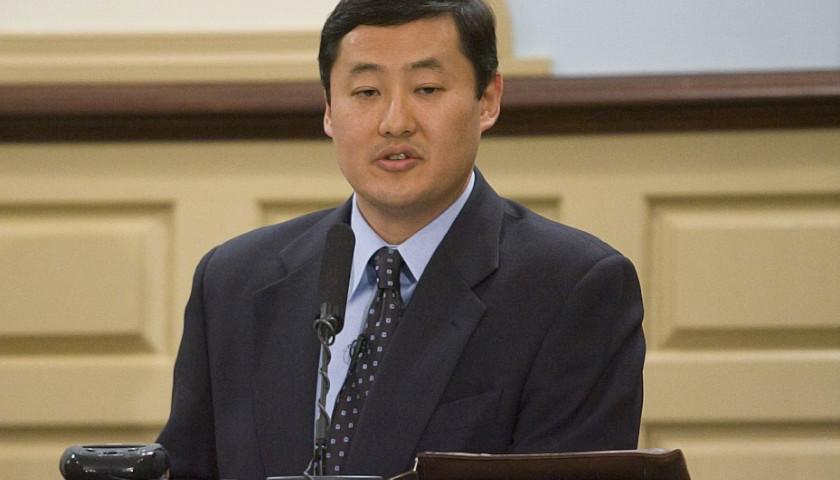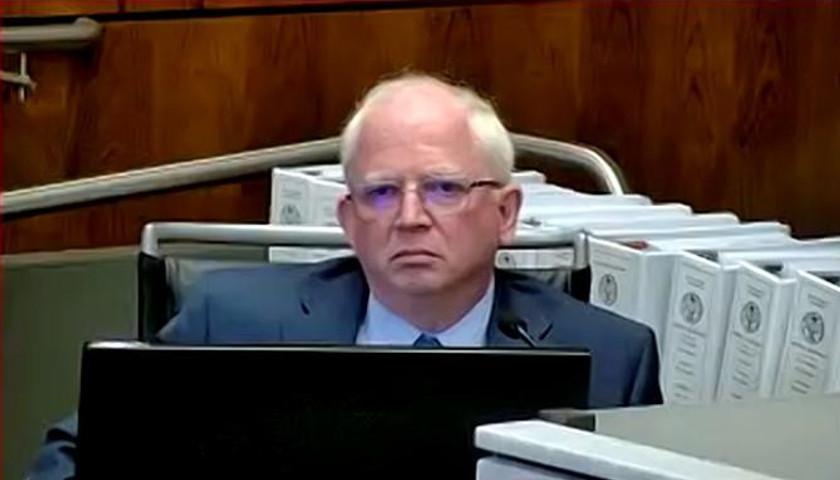The disbarment trial of Donald Trump’s attorney and constitutional legal scholar John Eastman began its sixth week on Tuesday, featuring more testimony from Berkeley constitutional law professor John Yoo. The trial moved into the second half a couple of weeks ago, where Eastman’s team presents his side of the case. His attorney Randy Miller brought Yoo back to contradict the testimony of the State Bar of California’s star witness, Matthew Seligman.
California Disciplinary Court Judge Yvette Roland, who donated to Democrats while serving on the bench, appeared to be a bit lost shortly after beginning Tuesday’s proceedings, asking Miller, “We’re in the midst of your case in chief right?” Shortly after that, the California bar’s attorney Duncan Carling told Roland that Yoo never claimed that there were dueling sets of electors in the 2020 election, which she did not remember.
Roland spent a lengthy amount of time debating back and forth with Miller on how much Yoo would be permitted to testify about. Roland’s position was that since Yoo admitted he hadn’t paid close attention to the 2020 presidential election, he should not be able to discuss specifically whether or not Vice President Mike Pence had the authority to reject or delay certification of electors from disputed states. She said regarding Yoo, who is considered one of the preeminent constitutional legal scholars in the country like Eastman, “There were a few issues where Professor Yoo was all over the place.” She added later, “His testimony is anything but solid on some of these issues.”

Roland finally agreed to let Yoo testify about postponing the acceptance of electoral slates, since he had already testified about the topic, but would not let him testify about rejecting them.
Roland was surprised when Carling told her that Yoo did not find fraud in the 2020 election. Carling cited his earlier testimony and previous statements he’d made in media articles.
Miller brought up a law review article Yoo co-authored with another professor in 2022 titled “Who Counts: The 12th Amendment, the Vice President, and the Electoral Count.” Roland had not allowed it to be discussed or admitted into evidence during previous trial days because the version submitted by Eastman’s team was the initial draft by Yoo, not the final draft that appeared in the Case Western law review. The final version is available on the internet and Miller told her previously that Yoo could explain any changes, but Roland refused to budge at the time.
Miller asked Yoo about the final version, which he submitted to the court, and Yoo said all of the revisions except one were minor. The substantive change was adding discussion of Congress’s 2022 amendment to the Electoral Count Act, which was passed after he’d submitted his draft. That amendment stated that it was within Congress’s authority to decide disputes over electoral slates, not the vice president. NPR said it was necessary because “[f]or years, legal scholars have worried the law was poorly written and in need of clarification.”
The article’s summary provides, “This article argues that, while the constitutional text is ambiguous, its best reading makes the Vice President, as President of the Senate, the only federal institution to judge the legitimacy of electoral votes, subject in limited cases to judicial review.” Yoo testified, “We think that it’s not Congress, so therefore it’s the vice president.”
Next, Miller asked Yoo whether he agreed with the position of the California bar’s star witness, Matthew Seligman, who said during his testimony that the vice president doesn’t have the authority to reject electoral slates. Yoo said not only did he disagree, but said Seligman contradicted his own writings, where Seligman took a position that it was ambiguous whether the vice president had that authority.
Yoo said Seligman made an assumption about English grammar that he disagreed with, claiming that the passive tense used in the Constitution gives the authority to Congress. Yoo “didn’t find that very persuasive.” And “most importantly, he doesn’t pay attention to the structure of the Constitution.” Yoo said the founders wanted to make sure Congress didn’t pick the president.
Yoo discussed instances in history where the vice president has exercised substantive authority in accepting or rejecting disputed slates of electors. He said in 1796, there was “funny business” with Vermont’s electoral votes. The state had four total, which gave Vice President John Adams the majority. Yoo said according to “sparse reporting” in Congress and a law review article, Adams counted the votes, paused, sat down, stood up again, and declared himself the president. He said Adams resolved the issue by disregarding the dispute, and he did not consult with Congress.
In 1800, Thomas Jefferson was running against Aaron Burr, Yoo said, and Georgia sent defective electoral votes; they didn’t follow the instructions properly about signing, sealing and delivering them. Thomas Jefferson was the vice president at the time. If he’d rejected them, there would have been five candidates sent to the House to be chosen, which would have included Federalist candidates (George Washington and John Adams’ party) and excluded Jefferson. Whereas if Jefferson accepted the votes, and tied with Burr, then it would only be Jefferson and Burr, and the two candidates would go to the House with no Federalists considered. So Jefferson accepted Vermont’s electoral votes and the election went to the House, Yoo concluded.
In both of those elections, Yoo noted that there weren’t competing slates of electors involved, there were merely questions about the validity of the slates offered. He said in 1796, there were accusations of fraud regarding Vermont’s electors. Yoo said the 1960 electoral dispute involving Hawaii’s electors was also an example of the vice president exercising his authority, although it was less authoritative since it was so far removed from the founding of the country when the Constitution was written.
Roland asked Yoo how many legal scholars believe it’s not the vice president’s responsibility to determine disputed electoral slates. Yoo said there has been only one legal scholar ever who thought otherwise, University of Virginia law professor John Harrison. Harrison claimed that Congress has the authority. Yoo added that two other legal scholars slightly touched on that position “in passing,” University of Texas law professor Sandy Levinson and Duke University law professor Ernie Young. The other legal scholars either believe it’s the vice president’s responsibility or believe it’s ambiguous so open to interpretation.
Roland started to ask him about legal scholars who agree with him that the vice president has the authority. Yoo named Boston University law professor Gary Lawson, who authored “The Electoral Count Mess: The Electoral Count Act of 1887 Is Unconstitutional, and Other Fun Facts (Plus a Few Random Academic Speculations) about Counting Electoral Votes” in 2022. The testimony diverged after that, so Yoo did not discuss any additional scholars.
The trial, which is live streamed, continues this week and most of next week, unless interrupted by the Georgia prosecution of Eastman. It begins at 10 a.m. Tuesdays through Fridays, but Roland is always late so actually begins about 10:20 a.m.
– – –
Rachel Alexander is a reporter at The Arizona Sun Times and The Star News Network. Follow Rachel on Twitter / X. Email tips to [email protected].





